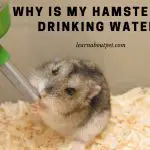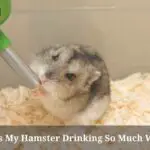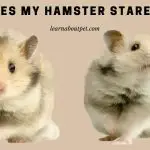There are times when you may get the impression that your hamster is purring. This would then cause you to wonder whether hamsters normally purr, or if something is wrong with yours.
And if hamsters do normally purr, you may have an interest in knowing why they do it. This article explores all these issues.
So the objective here is firstly to find out whether hamsters are capable of purring.
Do hamsters purr? If it turns out that the hamsters are capable of purring, the further objective is to find out why they purr, whether the purring is a good or bad sign, and what you can do about it.
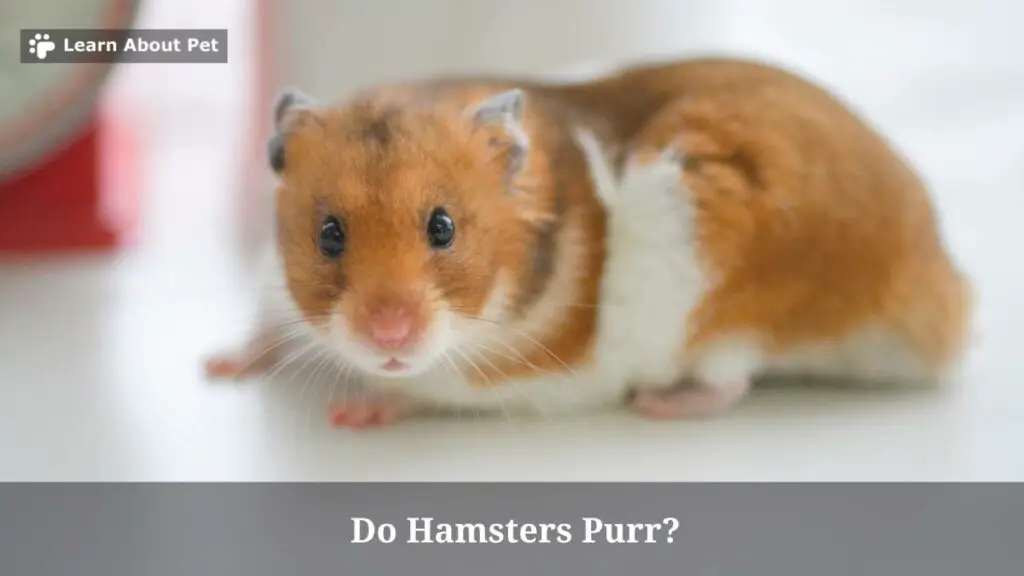
Can Hamsters Purr?
There are times when hamsters vibrate, and this comes across as ‘purring’. We also have times when hamsters make clicking sounds which also, in one sense, comes across as ‘purring’.
So hamsters are capable of ‘purring’ in those two ways.
To be sure, the hamster purring sound is usually not as loud as, say, a cat’s purring sound.
If you encounter a purring hamster, it is more likely to be vibrating its body or grinding teeth. What you then hear, as a result of the vibration/teeth grinding, is a hamster subtle purring noise.
The subtle noise comes from the vibrating hamster, apparently as a result of the rhythmic vibration. Or it comes from teeth clicking.
Why Do Hamsters Purr?
So far, we have said that hamsters are capable of making subtle purring sounds.
The question that follows is on why they do it.
Why do hamsters purr? Hamsters typically purr when they are nervous. But there are also cases in which the hamsters may purr because they are happy, or because of coldness. Angry, agitated hamsters sometimes also make clicking noises that sound like purring.
As noted earlier, what really tends to be happening is that the hamsters are vibrating. The vibrations then lead to the production of what seems like purring sound.
Thus the more fundamental question we ought to be asking ourselves here is, what does it mean when your hamster vibrates? That is analogous to asking, what does it mean when hamsters purr?
In understanding why a specific hamster is purring at a given point in time, you need to look at the context.
For instance, if my hamster vibrates each time I stroke her, I would tend to attribute the purring to nervousness.
But there would also be the possibility of happiness being the reason why my hamster purrs each time I stroke her.
Another case in which the hamster starts purring when the temperature falls drastically would be attributable to coldness.
Ultimately, in figuring out why does hamsters purr, you have to look at the context. Context is important in understanding why do hamsters vibrate (and hence ‘purr’) in various situations.
For instance, why do hamsters purr you pet them? This could be due to nervousness: as these are perpetually scared prey animals.
The purring can however also be due to happiness. Indeed if you research on how do you know when a hamster is happy, you see that ‘purring’ can be one of the signs.
Why Do Syrian Hamsters Purr?
In some cases, Syrian hamsters may purr (vibrate and hence produce purring sound) because they are nervous.
There are also cases in which the purring by Syrian hamsters is an indication of happiness.
Further on, there are cases in which the purring by Syrian hamsters is a sign of coldness. So you find the Syrian hamsters chattering teeth, producing what seems like purring sound.
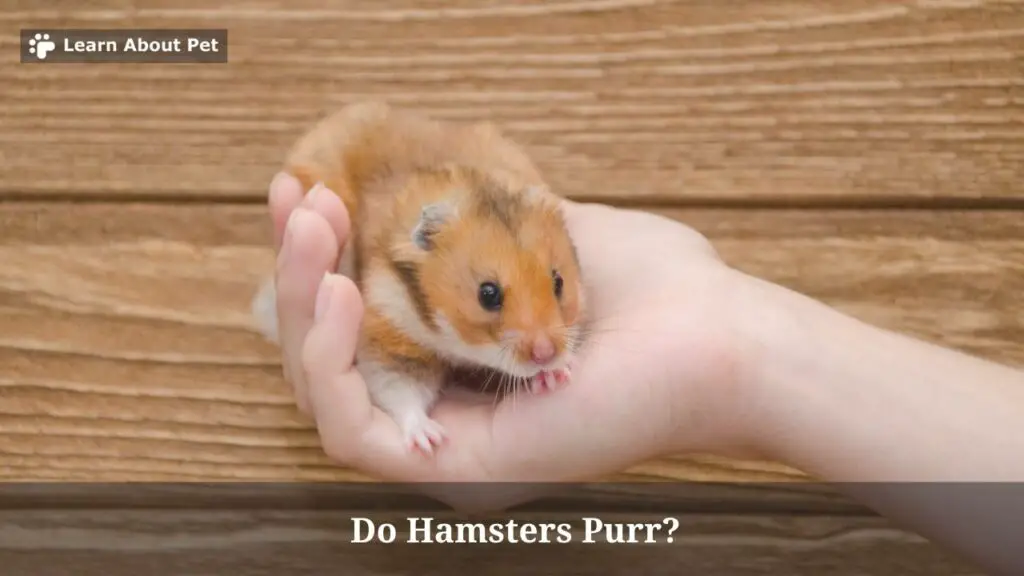
Why Do Chinese Dwarf Hamsters Purr?
Sometimes, when you pick a Chinese Dwarf hamster suddenly or rough, it will purr. In this case, you find that the Chinese hamster is purring on account of nervousness.
Because of your sudden or rough handling, you make the hamster think that you will harm it. So that creates nervousness, leading to production of a subtle purring sound.
But such nervousness is not the only possible reason for a Chinese Dwarf hamster purring. There are other situations in which you find the Chinese Dwarf hamster purring for more positive reasons.
For instance, if the Chinese hamster feels happy, it may purr. Indeed, if you read up on the subject of do hamsters make noises when they are happy, you will find that they really do: and one of those is a subtle vibrating/purring sound.
Thus your Chinese Dwarf hamster’s purring could also be attributable to happiness.
At yet another level, what you perceive as purring may in fact be teeth chattering, due to coldness.
And if the Chinese hamster is particularly angry or agitated, it may tend to purr subtly (by clicking teeth) – as a way of expressing the emotion.
Why Do Robo Hamsters Purr?
The most likely cause for a Robo hamster purring is nervousness. Thus if your Robo hamster is purring, you need to first rule out the possibility of something making it nervous.
Another possible cause for a Robo hamster purring is coldness. If it is very cold, the Robo hamster’s teeth may chatter, producing a rhythmic clicking sound which seems like purring.
Happiness may in some cases be a cause for a Robo Hamster purring.
If there doesn’t seem to be something making the Robo hamster nervous, and it is also not cold enough for its teeth to chatter, happiness may be the cause for it purring.
But then again, anger or agitation may be the reason for the Robo hamster making clicking (apparent purring) sounds.
Sometimes, what is making the Robo hamster angry or agitated may be something that is not so obvious. Take, for instance, exposure to perfume.
So we start by asking ourselves, do hamsters like perfume? And the answer is an absolute ‘no’.
It then follows that if you are continually exposing the hamster to very strong perfume, it may get agitated to a point of starting to make clicking sounds. And that then creates the impression of a ‘purring hamster’.
What Should You Do If Your Hamster Is Purring?
You need to start by identifying the most likely reason for the hamster purring.
As said earlier, one common reason for hamsters purring is nervousness. Therefore establish if anything in the hamster’s life is making it nervous. This would include the presence of perceived hamster predators.
If you find something that may be making the hamster nervous, get rid of it (or move it away). This may get the hamster to stop purring, if the purring was due to nervousness.
Another possible reason for hamster purring is coldness. Coldness leads to teeth chattering, which in turn produces a seemingly purring sound.
In case your hamster seems to be purring due to extreme cold, find ways of raising the temperatures. Once you get better temperatures, the hamster may stop chattering teeth, and hence stop seeming to purr.
If the hamster’s apparent purring is actually a clicking sound due to anger or agitation, find out what is bothering the hamster. Then mitigate it, to get the hamster to stop clicking teeth angrily, and seeming to purr.
On the other hand, if the hamster really seems to be purring due to happiness, identify what you are doing right. Then keep it up. But don’t overdo it: as it may soon start irritating the hamster, leading to unhappiness.
Final Verdict – Do Hamsters Purr
Hamsters do produce what seem to be subtle purring noises.
One mechanism through which hamsters purr is the vibrating mechanism. When hamsters are nervous or very happy, they may vibrate a bit, leading to the production of subtle purring sounds.
Another mechanism through which hamsters purr is the teeth clicking mechanism. When hamsters are very angry or agitated, they may click their teeth, producing what sounds like a purring sound.
Very cold hamsters may also have their teeth chatter, leading to the production of a seemingly purring sound.
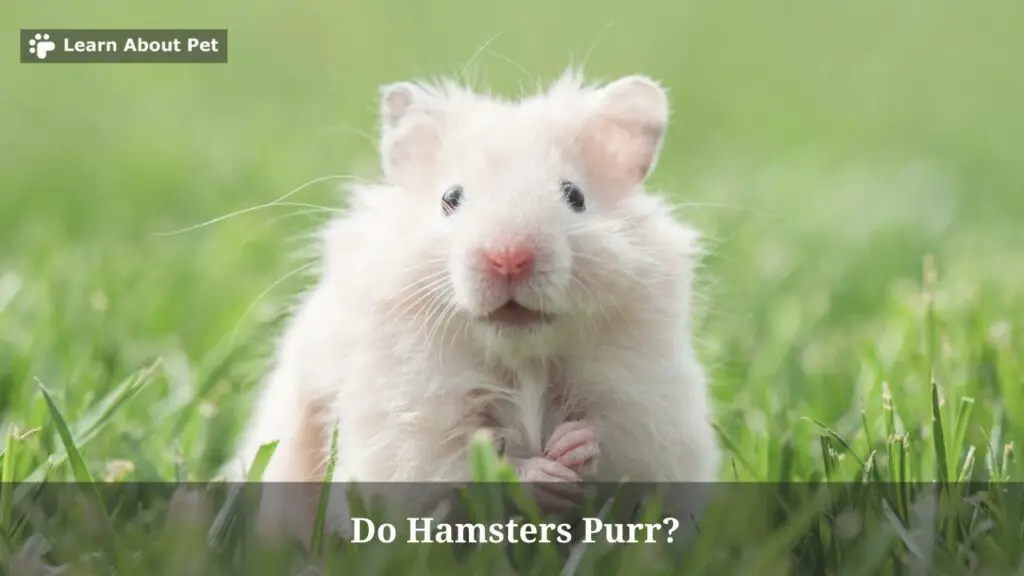
If you find your hamster purring, you need to identify the probable reason behind the purring.
In case it is due to things like nervousness, anger or agitation, you can get rid of the stressors, in order to get the hamster to stop purring.
If it is due to coldness, find ways of improving the temperature conditions, to get the hamster to stop chattering (and hence producing purring sounds).
And if it is due to apparent happiness, find out what seems to be making the hamster happy. Then keep it up, in moderation, to maintain the hamster’s state of happiness which is making it ‘purr’ positively.
As a pet lover, make sure to learn about pet more and give your pet hamster a good and comfortable life!

Welcome to Learn About Pet. My name is Rajkumar Ravichandran and I love all pets, travel, and amazing food. I write about my passion and personal experience caring for multiple pets in this blog! ❤️
Post Disclaimer
DISCLAIMER: THIS BLOG OR WEBSITE, "Learn About Pet", DOES NOT PROVIDE YOU WITH MEDICAL ADVICE AND IS NOT A SUBSTITUTE FOR MEDICAL ADVICE. ALWAYS GET IN TOUCH WITH YOUR PERSONAL VETERINARIAN AND USE INFORMATION HERE AS GENERAL ADVICE.
The information, including but not limited to, text, graphics, images and other material contained on this website are for informational purposes only. No material on this site is intended to be a substitute for professional veterinary advice, food recommendation, diagnosis, or treatment. Always seek the advice of your veterinarian or other qualified health care provider with any questions you may have regarding a medical condition or for pet food related questions.

